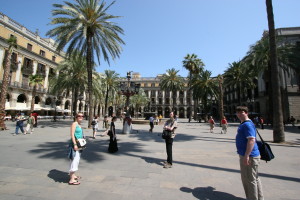I am very proud of GNOME (and our new decisive GNOME Foundation board) for the initial progress we’ve made on the lack of involvement of women in our project. The discussion has opened a lot of peoples’ eyes to a problem that they didn’t recognise before, and we’ve already taken some steps to deal with it:
- GNOME’s Women’s Summer Outreach Program (WSOP): 6 mentored projects (3 more than planned, thanks to Google’s support) bringing Women into our community. The quantity and quality of the applications surprised many of us, and is great ammunition against the “women are biologically incapable/predisposed” loonies. For the regular Google Summer of Code, I had 1 application for a Glom project. I had 5 for WSOP, some of which were very experienced already, though not in open source.
- GNOME’s Code of Conduct (or “Ethics”, if you prefer) looks likely to become official, reinforcing our existing inclusive and tolerant community, and advertising it to the people looking for a chance. I just need to find a readable version of that inspirational first sentence. Suggestions are very welcome.
- What’s next?
Now I’d like to start seeing more women on Planet GNOME and GNOME’s Planet SOC (Update: Planet WSOP 2006). I’m encouraging my WSOP applicants to get involved even though their applications weren’t approved, and they do seem more interested in that than the money, so I have high hopes. I’m suggesting that they start blogs, or that they mention their experiences on their existing blogs, and that they try to be involved in the existing mailing lists (such as gnome-love) while they are also getting direct help from me, setting up their development environments and learning about the project. While not wanting to scare them away, I’d like to get them involved with GNOME’s community as soon as possible, because that’s what makes people stay, and what keeps them learning.
There’s also been a lot of Pangolossianism from men during the discussion, along the lines of women not being generally biologically capable, or not being generally interested, and . This is the same 19th century nonsense that said that the poor were poor because they should be poor. Like most prejudice and conservatism it’s generally justified by selective anecdotal examples and resists contrary evidence. This always displays a fantastically selfish lack of empathy or imagination when confronted with the actual numbers.
Since seeing those discussions I am more convinced than before that there’s some real problems to solve, and I’m glad that we are solving them. And when women can help each other then they don’t have to waste time persuading men about this anyway.
Update: I forgot to mention, I was particularly persuaded when someone mentioned that, while female involvement and achievment in the sciences and mathematics is low in most schools, all-female schools have higher achievement rates in these subjects than the men in those regular schools. Obviously there are other factors in these schools, but it shows what is possible, and what should be possible without creating special environments. Anyone have a link to an actual study? – presumably the statisticians have tried to take account of details such as selection bias.


